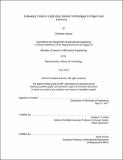Evaluating Trends in Light-Duty Vehicle Technologies to Project Fuel Economy
Author(s)
Adcock, Christiane
DownloadFull printable version (1.248Mb)
Other Contributors
Massachusetts Institute of Technology. Department of Mechanical Engineering.
Advisor
Jessika E. Trancik.
Terms of use
Metadata
Show full item recordAbstract
Predicting the fuel economy of future light-duty vehicles provides insight into the expected greenhouse gas emissions, oil consumption, and operating costs in the transportation sector. Fuel economy is difficult to directly predict, however, due to the large number of vehicle characteristics that influence fuel economy. These characteristics include curb weight, powertrain efficiency, tire properties, and aerodynamic properties. In addition, the characteristics vary by powertrain technology and vehicle class. This study evaluates past trends and literature projections for each attribute. It then projects fuel economy for three powertrain technologies and eight vehicle classes using current values, past trends, and literature projections for the vehicle characteristics and the Environmental Protection Agency's drive cycles. Fuel economy for internal combustion engine vehicles (ICEVs), hybrid electric vehicles (HEVs), and battery electric vehicles (BEVs) are projected to increase at rates similar to past years. At these rates, average HEVs and BEVs will significantly exceed Corporate Average Fuel Economy standards for 2021 and 2025, and ICEVs will fall significantly short of these standards. This analysis provides an easily adaptable framework to project fuel economy that accounts for the large number of contributing vehicle characteristics.
Description
Thesis: S.B., Massachusetts Institute of Technology, Department of Mechanical Engineering, 2018. This electronic version was submitted by the student author. The certified thesis is available in the Institute Archives and Special Collections. Cataloged from student-submitted PDF version of thesis. Includes bibliographical references (pages 39-40).
Date issued
2018Department
Massachusetts Institute of Technology. Department of Mechanical EngineeringPublisher
Massachusetts Institute of Technology
Keywords
Mechanical Engineering.